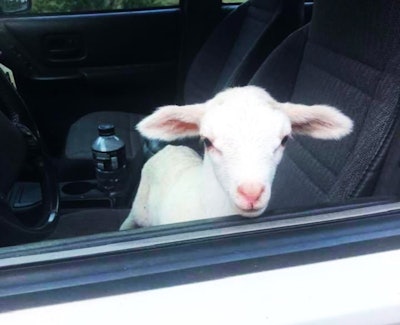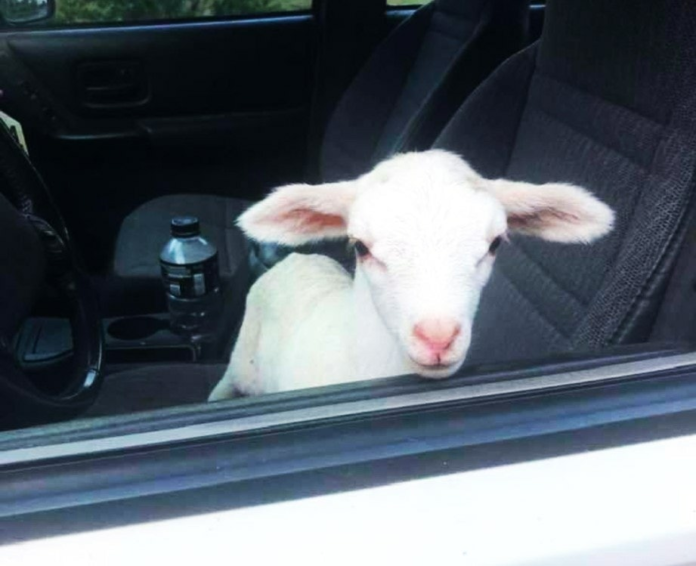[ad_1]
The year was 2007. I was at a produce shed one night in Brawley, California, waiting on a load of lettuce to come out of the fields. It was going to be a long sit. This was one of those “best to get there the night before so you can take your place in line” brokered loads. There was another trucker there, also waiting, a young Tennessee driver. He was half-hippie, half-mountain man, and just out there enough to help the time pass quickly with interesting conversation.
The man and his mom were teaming for a reefer outfit out of Nashville. They had a five-days-on, five-days-off gig, which gave him time to pursue his real passions — web design, and the breeding of Tennessee fainting goats. In another lifetime, my wife and I had also been goat people. Or, more accurately, my wife had once milked seven goats, while I did a lot of complaining about them.
Naturally, the mountain man and I began swapping goat stories. Nothing, I contend, will reveal to you the true depths of your character deficits like a small herd of goats and a bad fence.
I told him how when I was working for a big hog farmer, he would give me all the runt piglets I could take. My wife would then nourish them with a concoction of goat’s milk and “feed bread,” outdated bread purchased for $10/pickup load from the commercial bakery distributor. She’d combine the bread, the milk and some water. It made about the richest slop you could feed a young piglet. In about a month, you couldn’t tell they’d ever been runts at all.
Sometimes we’d make out pretty well at the sale barn, selling them in lots of three or four.
Then she’d catch me boasting to a friend about our agribusiness exploits, get me off to the side and call me out. “Paul, all you do is complain about those goats, but when you’re around your friends it’s like they’re the greatest thing that’s ever happened to you. Make up your mind.”
[Related: OTR to home: Making local trucking work with Mike ‘The Boston Trucker’ Gaffin]
I decided to take the Billy by the horns, so to speak, and begin assisting in the management of the herd. My first order of business was an Alpine doe that kept breaching the fence of the pasture. She was a regular Houdini. Every time she got out, she would head straight for my $500 station wagon, forthrightly hop onto the hood, and defecate all over it. This went on for several months. When I finally got the money scared up, I went down to the farm store and bought the biggest electric fence charger I could afford, along with all the insulated fence posts and wire.
I would give that little fecal artist a brief tutorial on the properties of electricity. Taking the 150-pound doe in my arms, I hollered, “See this? This. Is. An. Electric. Fence! Next time you try to get out and crap on my car, it’s going to feel like this!”
Turns out, it was I who gleaned the greatest lesson on electricity that day. Given I was holding the goat in my arms, I was providing the ground. When I held her legs against the wire, intent on “instructing” her, I received the worst electric shock of my life. It knocked me to the ground screaming, leaving the nanny unscathed.
She’d gotten my goat? Something like that. Through my writhing and cursing, I looked up to see my wife and children doubled over with laughter.
The conversation at the produce barn drove deep into the night. The mountain man was telling me how the website he designed was garnering interest in his Tennessee fainting goats from all over the United States, fetching prices as high as $500 per kid. With their five-on, five-off schedule, he and his mom were truly building a life separate from trucking. Then, sensing my admiration, he revealed to me his darkest secret about where the real money was in goats — the haulage. Turns out, he was delivering the goats himself to points west, all along I-40.
“I mean, like, how do you transport them?” I asked. “With a reefer and all?”
“Dude, I just throw ’em in the sleeper. These people will pay as much for the shipping as they will for the goat. And if they’re not there to meet me at the designated time, guess what? They forfeit their deposit. I get all that in writing up front. It’s all spelled out on the website.”
That seemed a bit unorthodox, but who was I to judge? At least I didn’t have to slip-seat with him.
Now he was on a roll, speaking more into the night than to me, the way a California produce hauler might.
“We make videos of them,” he said. “The more you can get them to faint, the more they’ll bring.”
About then, something soured his demeanor, as if the recollection of some slight or injury had overcome his mood.
“Things were going pretty well until that little snitch we share our truck with dropped a dime on us. There’s nothing I hate like a snitch. Except maybe a clean freak.
“We came into work a couple weeks ago, and there was a note to see safety. The safety man took a ziploc out of his desk drawer. OK, it had some straw and a few goat droppings in it. Apparently I hadn’t got everything quite vacuumed up, and this little snitch, instead of being a man and coming to me, went straight to management.
“So he says, ‘This was found in the sleeper of your assigned truck. Any idea how it got there?’
“Then he says, ‘If this ever happens again, I’m going to have to let you go.’ So we’re pretty much shut down. I’ve got three doelings sold to a farm in New Mexico, with deposits in hand, and this little self-righteous SOB has completely shut me down.”
Then he turned to me.
“Say, how often do you get out here? Wanna make some extra money? I can pay you a hundred percent of the freight.”
He gave me his web address, and told me to contact him there if I was interested. Then it was time to bed down for the night. He was called to the dock much sooner than me in the wee hours of morning. We never spoke again.
[Related: This could be the year: Recollections of Great Recession trucking side gigs, successes and failures]
Somehow, though, I found myself envying the Tennessee fainting goat breeder.
Notwithstanding the contempt he must have endured around the terminal after the livestock-in-the-sleeper revelation, he had dared to have a dream outside of just pushing a truck down the road. He had found a work/life balance that enabled him to build a farm.
Five on, five off, and all he had to do was relinquish his absolute right to be the sole operator of somebody else’s truck. All he had to do was turn it in clean and not haul cargo that crapped in his boss’s sleeper.
Some fifteen years later, as I embark on a life of just trucking half the time, I realize I’m going to have to accept the life of a slip-seat driver. Thankfully, to the best of my knowledge, no one has hauled livestock in the sleeper of old 812 while I was off chasing grandchildren.
 It can be hard to predict sometimes just who — or what — might have been piloting the vehicle before you took the reins. …
It can be hard to predict sometimes just who — or what — might have been piloting the vehicle before you took the reins. …
At the same time, I know it’s time I tighten my own game.
So I called my old boss, Kevin Glass, and asked him to give it to me straight. Mr. Glass, now himself semi-retired, has managed his share of slip-seat operations. Today’s question: Just how not to be a slip-seat driver from hell, like old goat boy. “I remember one driver in particular who had about a pound of peanut husks spilled on the floor of his truck one day,” Glass said. “But he had written a song about me, so I went ahead and let it slide.”
Full disclosure: that driver was me. I could get pretty messy when the loads got tight, but always tried to turn the truck in clean.
“I always said,” Mr. Glass continued, “look I don’t care how messy you get when you’re working, just turn the truck in clean. And at least, Paul, you would clean your truck up before you turned it in” — most of the time.
“But there’s just some guys you can’t reach,” he said. “Some people are just slobs. I had to suspend one guy twice when I worked for [company name withheld by request]. He had left a pie in his sleeper which somehow exploded. One of the mechanics came in and said, ‘You need to see this truck.’ I mean, there were half eaten hamburgers on the floor, pickles and pickle juice everywhere. I suspended him once for three days and once for five days.”
Glass contended there’s a matchmaking aspect to successfully slip-seating. “You have to be really careful who you pair up,’ he said. “Some guys are just anal, and won’t tolerate as much as a coffee stain in the cup holder.
“We had a guy out of Texas who had his company truck all chromed-out. He was always out there polishing it. He kept it absolutely immaculate. He was a road driver. Well, they were short on trucks one day and they gave his truck to a route driver. That [road driver] was at the terminal that next day. He was a great big guy. Looked like he could have played for the Dallas Cowboys. He was pacing around and just kept saying, ‘He’s going to trash my truck. I guarantee you, he’s going to trash my truck.'”
Sure enough, when that driver got back, coffee had spilled all over the floor. As Glass told it, “There were fast food bags and wrappers everywhere. So he took all that trash out of the truck, placed it on the hood of that other driver’s brand-new Suburban, climbed on top of that guy’s car, and right there in front of God and everyone else took a [dump] on the hood of that man’s car.”
If you think these are mere isolated cases, think again. Awareness of the problem of sharing a truck with hygienically-challenged drivers is such that it’s spawned the development of a product by Brown Ox Ventures to address that specific issue.
Vann Brown, inventor and owner of Brown Ox Ventures, maker of the BullSnot brand of cleaning products, told of a conversation with an operator at MATS a few years ago. “The driver had to slip-seat with another driver who smoked and didn’t like to take baths,” Brown said. “To top it off, he had a bulldog that he took with him that didn’t have full control of its bodily fluids. This driver was cussing mad. I like truck drivers, because they just lay it on the line. He wanted me to develop a product that would destroy all that smell completely.”
That was the genesis of the BlastABull Odor Eliminator, which, according to Brown, “destroys stink on a molecular level,” rather than just covering it up.
Besides truckers, Brown said BlastABull has garnered a following among certain country singers, as it can remove the scent of any kind of smoke, including tobacco and marijuana.
Brown, for his part, recommends a specific fumigation technique for slip-seat drivers. First spray down the cab and then attach the tube to the nozzle and spray directly into the vents with the air off. Then turn the air on and put it on recirculation for maximum freshness.
I know a lot of the owner-ops here will simply ask, “Why even stay at a job if you’re being forced to share a truck with an absolute slob?”
For part-timers and flex-timers like me, truck sharing is simply a reality. Moreover, as fleets continue to compete for drivers, you’d be surprised just who they will allow to share a truck these days.
Full disclosure, again: Brown Ox Ventures is a sponsor of Long Haul Paul Music.
[ad_2]
Source link







